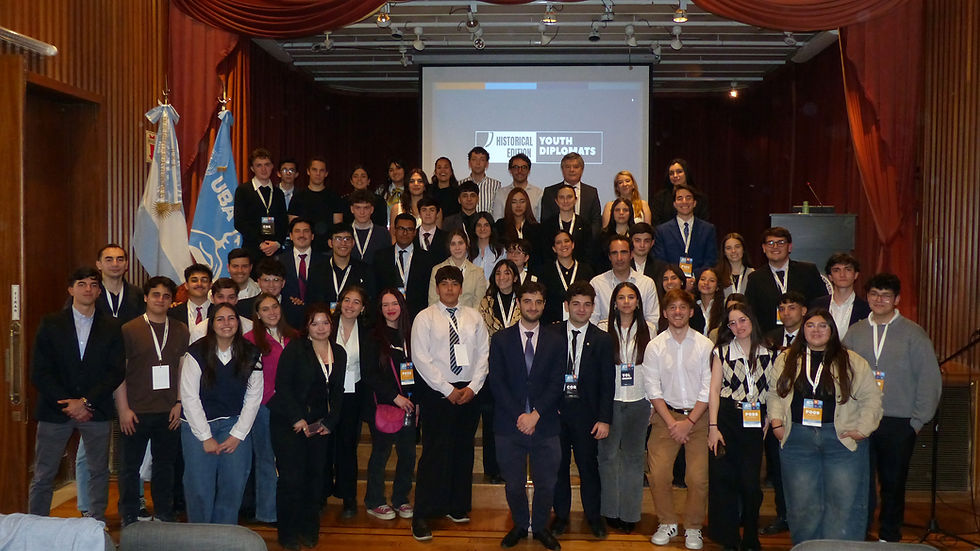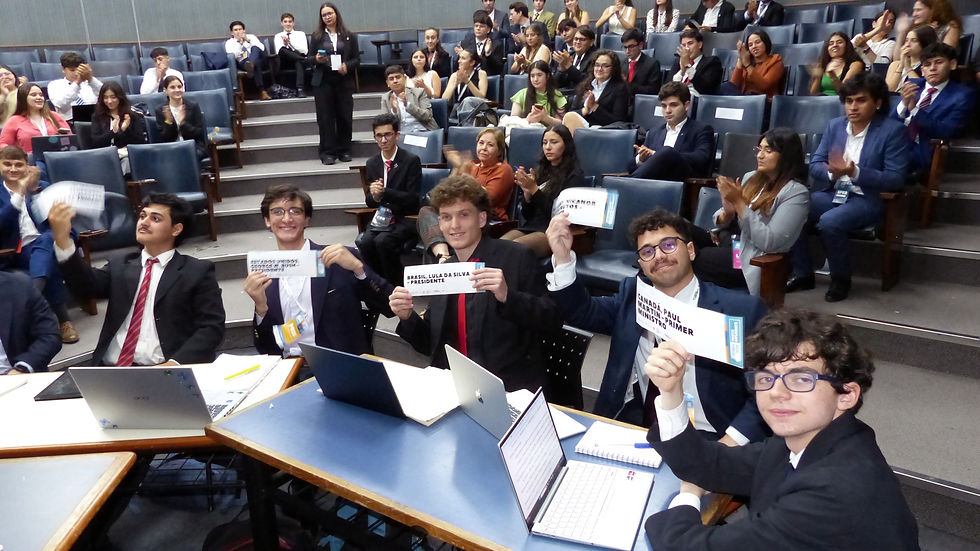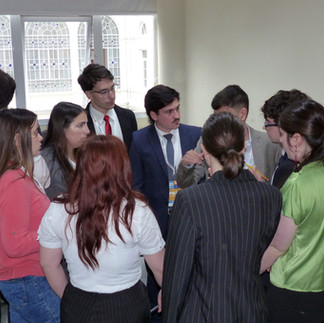Rediscovering Argentine History through Foreign Relations
- Kairos Global

- Nov 7, 2025
- 3 min read
The alliance between Global Kairos, the Center for Studies and Debate on International Organizations at the University of Buenos Aires (CEDOI-UBA), and the Professional Association of the Argentine Foreign Service (APSEN) gave the ninth edition of Youth Diplomats a renewed meaning: connecting the experience of career diplomats with the enthusiasm of a new generation of young leaders.

The ninth edition of Youth Diplomats took place on November 1 and 2 at the Faculty of Economic Sciences of the University of Buenos Aires, following an opening session on Friday, October 31, and concluding on Monday, November 3, with a closing event filled with emotion, reflection, and commitment.
Throughout two intensive days, more than a hundred young participants from across Argentina engaged in simulations and dialogue spaces that tested their negotiation, communication, and strategic thinking skills. Yet this edition stood out for something new: the partnership with APSEN, which gave the programme an unprecedented dimension.

Thanks to this collaboration, participants were able to rediscover Argentina’s history through the lens of its foreign relations, understanding how the country’s diplomatic milestones—its agreements, tensions, and lessons learned—are part of a much deeper fabric that connects identity, sovereignty, and international projection. The debates and role-playing exercises were enriched by that historical perspective, bringing young people closer to the very heart of Argentina’s diplomatic practice.
The event began on Friday with the traditional opening day of lectures and training sessions led by guest professionals. The opening panel, “Argentine Diplomacy and Global Challenges,” featured the President of APSEN, Minister Laura Zerillo, Minister Luz Melón, Prof. Máximo Fernández, Director of CEDOI-UBA, and Marcos Giordano, Board Member of Youth Diplomats.
In the afternoon, participants continued their learning journey through the panel “Youth Diplomacy: The Impact of Scholarships on Global Formation,” in which four young leaders shared their experiences. The programme also included “Mercosur in Perspective: History, Law, and the Economics of Regional Integration,” presented by international analyst Ignacio Ortiz Vila and Prof. Dr. Alberto Biglieri. regional integration expert. Lastly, “Sustainable Development and Climate Change in the 21st Century,” delivered by Dr. Facundo Ríos, an expert in Environmental Law.
The first day concluded with the participation of Ambassador Marcelo Buffetti, Director of the Institute of the Argentine Foreign Service (ISEN), who engaged in an informal conversation with the young attendees, sharing insights from his career and offering advice to those aspiring to represent Argentina abroad.

Perhaps the most powerful outcome of this alliance could be seen during the model’s core days: its ability to bring generations together. In a single space, high-school students, university students, ISEN fellows, and career diplomats interacted side by side. The rarely seen scene embodied a genuine intergenerational dialogue, where experience and vocation met as equals. The diplomats did not come to lecture, but to share; the young participants did not listen passively, but questioned, challenged, and contributed fresh perspectives on the global challenges Argentina faces today.
Over the weekend, the activities revolved around a shared idea: understanding that diplomacy is not a distant affair, but a civic practice that can be exercised from multiple fields—education, volunteerism, cooperation, or social leadership. The collaboration between Global Kairos, CEDOI, and APSEN thus became a model of coordination between civil society and the diplomatic corps, demonstrating that youth training can go hand in hand with institutional tradition and professional experience.

The closing ceremony, held at APSEN headquarters on Monday 3, captured the spirit of the entire event. Amidst applause, the ten award recipients of the programme shared their conclusions and proposals—but also their gratitude for having taken part in a collective learning experience where every voice mattered. Later that afternoon, ISEN fellows gave a talk on their experience and opened a space for questions about the diplomatic career.
They highlighted the importance of seeing young people embrace, with both seriousness and creativity, the challenge of representing Argentina. The students, in turn, expressed their appreciation for the opportunity to share a space with those who shape the country’s foreign policy every day.
The partnership with APSEN not only broadened the academic and symbolic scope of Youth Diplomats, but also left a profound mark. It showed that forming new generations of leaders requires meeting and learning from those who paved the way before, and that diplomacy—far from being an elite exercise—can be a common language among those who share a vocation for service.
This edition of Youth Diplomats was not just a simulation: it was an experience of transmission and renewal. A space where generations recognised each other, history was reinterpreted, and the future began to be written once again—this time, in the language of cooperation.






























Comments